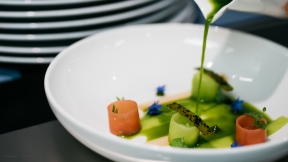Award-winning culinary indulgence – and no meat in sight
As the only vegetarian restaurant in Austria to be awarded a Michelin star, Tian is the perfect example of how the concept can work. Head chef Paul Ivíc has made it his mission to introduce his guests to vegetarian cuisine and make them feel inspired by it. He uses sustainably sourced ingredients and gives everyone – whether they are vegetarian or not – this piece of advice: “Take a look at where the ingredients you’re using come from!” For any cook, this is the key to plating up a delicious dish. As he puts it, Ivíc’s aim is “to serve vegetarian food that makes the taste buds tingle, and stirs up the senses” – and there is no doubt that he has achieved this. As an aside, the French name “Tian” incidentally refers to a type of vegetarian stew.
Vegetarian food of the highest calibre is not just found in Austria. It’s also found in Italy. The Joia restaurant in Milan serves up fare that is as delicious as that served by its Austrian counterpart. This temple to gastronomy was first awarded a Michelin star in 1996, and has been the go-to destination for vegetarians ever since. Head chef Pietro Leemann operates what he terms a “non-violent” kitchen there. Following his training as a chef, he embarked on several trips and discovered his passion for meat-free cooking. Vegan cuisine doesn’t come quite so naturally to every chef, however. In particular, it is the need to avoid animal products such as honey, eggs and milk that is too much for some to handle.



